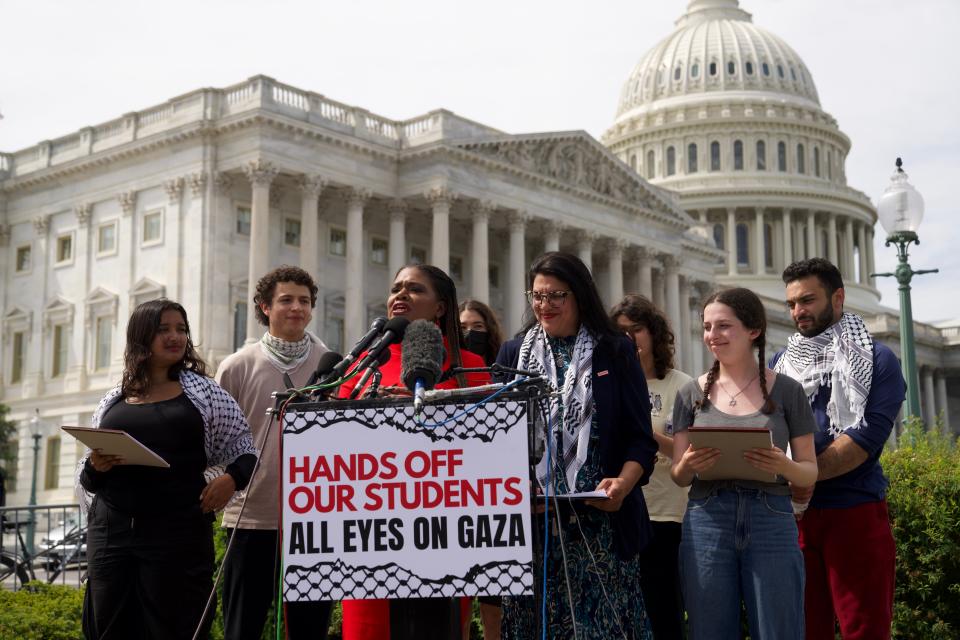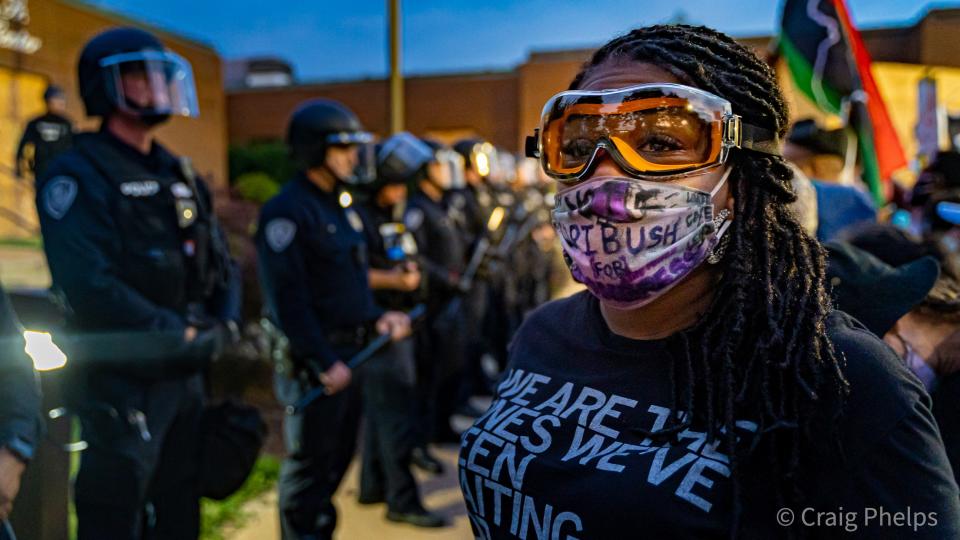Cori Bush Calls Out Police and Government Repression of Social Movements

Chip Somodevilla/Getty Images
Ten years ago this August, a white police officer killed 18-year-old Michael Brown in Ferguson, Missouri. What happened on Canfield Drive that day sparked a nationwide movement to save Black lives, end police brutality, and make safety a reality for all people. As a registered nurse, pastor, and local activist, I spent over 400 days protesting alongside thousands of my fellow community members.
I will never forget the brutality we faced in response to our calls for humanity. Police used tear gas, pepper spray, rubber bullets, noise munitions, batons, shields, fists, and boots against us. The Missouri National Guard called us “enemy forces.” Our government labeled us “Black identity extremists.” Many politicians condemned us. Those of us on the front lines were traumatized, but we knew that time would prove we were on the right side of history — and it did. Time will prove the same for the students currently protesting across the country.
From Columbia University in New York City to Washington University in St. Louis to The George Washington University in Washington, DC, thousands of students, faculty, staff, alumni, and their allies of different faiths, ethnicities, and backgrounds have engaged in overwhelmingly nonviolent civil disobedience in support of Palestinian human rights and an end to their universities’ complicity in violation of those rights.
For years, politicians, university administrators, and media figures across the political spectrum have professed their commitment to free speech, diversity, and inclusion. They have feigned concern about the state of free speech and dissent on college campuses. Yet when presented with organized, disciplined, nonviolent protest in support of a moral cause that is routinely stigmatized, many of those same people have championed violent, repressive crackdowns intended to crush dissent.

We have all seen the footage of armed officers using pepper spray, rubber bullets, fists, and boots against students, faculty, and their allies without provocation. We have all witnessed the cowardly response from too many university administrators, some of whom would rather risk or inflict violence on their own community members than grapple with calls for divestment. We have all heard the stories of students arrested, assaulted, suspended, evicted, banned, smeared, humiliated.
Despite knowing what happened nearby in 2014 and expressing support for the Ferguson protesters, Washington University administrators in St. Louis summoned dozens of law enforcement officers to a protest where students, faculty, and other community members were peacefully gathered. Some were brutalized. Officers were filmed beating and body slamming a 65-year-old professor at Southern Illinois University Edwardsville, Steve Tamari, who was later hospitalized with multiple broken ribs and a broken hand. Steve is my friend and I am thankful he’s alive. I met him and his wife, Sandra, both Palestinian-Americans, when they joined us in the streets during the Ferguson Uprising. Protesters are now being smeared as violent and antisemitic. Let me be clear: Trespassing, setting up tents, and carrying signs are not violent. Condemning a government that has killed more than 14,5000 children in seven months and created a humanitarian catastrophe is not antisemitic. Beating, tackling, pepper spraying, and shooting rubber bullets at people is violent. The January 6 insurrection was violent. Denying the humanity of the many Jewish people who are participating in the encampments is antisemitic.
None of what protesters in Ferguson and at Columbia University have experienced is new — it’s happened hundreds of times throughout our history. It happened in Boston in 1770, when protesters supported independence from British rule. It happened in Pennsylvania in 1897, when mine workers demanded labor rights. It happened in Virginia in 1917, when protesters demanded equal rights for women. It happened in Selma in 1965, when protesters demanded civil rights for Black people. It happened in New York, Chicago, St. Louis, and elsewhere in 1968, when protesters demanded an end to the Vietnam War. And it happened in Washington, DC, and in communities all across our country in 2020, when protesters demanded an end to police brutality.

Behind every attempt to silence a protester is an idea that those in power don’t want people to hear, yet protest movements have been remarkably successful throughout our history. The women’s suffrage movement led to the ratification of the 19th Amendment despite opposition from those in power. The same is true of the Civil Rights movement, which culminated in the Civil Rights Act of 1964 and Voting Rights Act of 1965, and the youth-led nationwide protests that led to the end of the Vietnam War, and South African apartheid.
Those lessons can be powerful. During the Ferguson protests, a group of Palestinians visited us and taught us how to protect ourselves against tear gas. That moment opened my eyes to the connection between state-sanctioned violence at home and abroad. I thought of that day when I first called for a ceasefire following the horrific October 7th attacks. I was labeled “disgraceful” and “repugnant” by the Biden administration, but that didn’t stop me from introducing the Ceasefire Now Resolution on October 16, 2023, which has served as a mobilization tool inside and outside of Congress. Our anti-war movement has helped pressure the Biden administration to call for a ceasefire after providing military funding and political cover that contributed to the killing of tens of thousands of Palestinians.
It’s time our government responded to popular social movements with an ear, instead of a boot. It’s time our leaders focused on investing in community-led safety through violence interruption, mental health crisis response, and summer jobs programs, among others, instead of endless war. And it’s time our president heeded the lessons of the past, including the anti-war and anti-apartheid protests he has lived through, instead of destroying the coalition that elected him and willfully clearing a path for a Donald Trump victory in November — an outcome no elected Democrat, including me, wants to see happen. We are indeed in a battle for the soul of the nation. These students represent the best of that soul. I stand with them.
Editor’s note: Washington University in St. Louis put out a statement saying that they called police after the group’s “words and actions” made it clear “that they did not have good intentions on our campus and that this demonstration had the potential to get out of control and become dangerous.” The school acknowledged arresting “100 individuals who refused to leave after being asked multiple times.” Teen Vogue reached out to the university police department for comment.
Stay up-to-date with the politics team. Sign up for the Teen Vogue Take
Originally Appeared on Teen Vogue
More great activism coverage from Teen Vogue:

